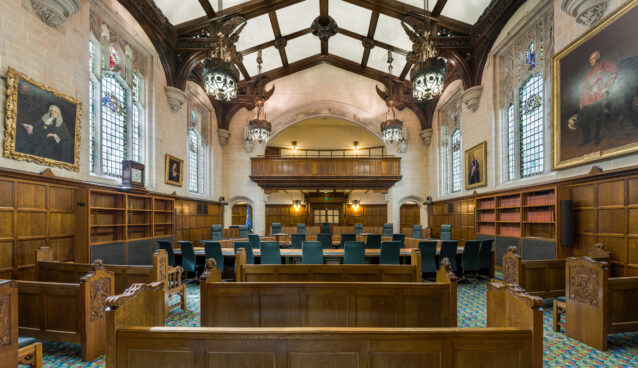Can The Supreme Court Claim Impartiality?

Since the eleven Supreme Court Justices delivered their verdict against PM Boris Johnson there have, naturally, been many people questioning their impartiality. Not least because there was no dissension in the judgement at all – the decision was unanimous. Such outcomes should be questioned and it’s the right of every person to do so. Commentators on the Remain side have been taking the unanimity of the decision as some indication of its rightness, but I don’t.
Join me in a thought experiment.
Let’s say for example, behind closed doors, that nine of the eleven Justices had ruled against the decision to prorogue parliament, and two ruled in favour of the Prime Minister’s decision. A ruling of nine to two would still render the same outcome, but it would leave two of the justices – potentially – on the wrong side of the result. And, let’s say the intended outcome of all this Remainer campaigning for the last three years really is to stop Brexit, and let’s say they eventually succeed (something this ruling certainly aids). Which Justice wants to find themselves on the outside of supporting the continuing EU empire? In this experiment I am led to ask: was the unanimity of the decision a pragmatic strength in numbers – together we stand or fall? There would be less to lose individually taking this approach, and everything to gain. If we Brexit, they all Brexit, and are equal recipients of that outcome but if we Remain who would want to be the one that had tried to stop it in the new EU centric future? This is just a thought experiment, I’m not making an allegation, but I do wonder if I am right. We’ll never know the thought processes of each mind engaged in that ruling. But I find the unanimity suspicious, and it makes me question the independence and objectivity of each involved in this process. You may have your own thoughts on the matter.
One thing seems certain – now the UK Supreme Court has begun ruling on political issues, and directing the Government, they can no longer avoid accusations of judicial activism and hide behind ‘separation of powers’ as if they are inviolable. We are now asking ourselves whether they just violated that separation. It seems we might begin to see US style confirmation hearings asking every question about political affiliations and digging over and bringing into the light the past life of any future Supreme Court Justice nominee. If the Supreme Court is to have the confidence of anyone I don’t see how they can avoid that now. Such a decision, just handed down, seems to make the political leanings of Justices fundamental to whether they can be regarded as impartial. Therefore, just as in the US, we will want to see that the make-up of the Court is balanced in its political leanings. From now on they can no longer claim this is no-one’s business. They made it our business.
What about that allegation going round social media?
As I said before I’m not the only one dubious about the impartiality of the Justices in this. One allegation in particular is being repeated so widely that one had to wonder if it was true. It was certainly damning enough to warrant further investigation. The claim in various posts on Twitter and Facebook went something like this:
“From the Law Gazette: ‘Nine out of the eleven Supreme Court Justices receive stipends of £175,000 from the EU and the Supreme Court itself is a member of the Presidents of the Supreme Judicial Courts of the EU’”
It’s a statement with three claims. First, that the other two claims are corroborated by the Law Gazette. Second, that nearly all of the Justices are in receipt of a significant payment from the EU. Third that the UK Supreme Court is a member of the Presidents of the Supreme Judicial Courts of the EU.
Is this from the Law Gazette?
Wherever this originated Google searches are not revealing a Law Gazette source so far. There’s some anecdotal evidence that it was posted as a comment on a Law Gazette page, but nothing to suggest it is corroborated by the Law Gazette itself. I’ve been unable to find the comment and so can’t pursue the one making it for further sources, but moderators can and do easily remove comments and so the source may no longer be online.
Links you can try:
Just read this comment in the Law Gazette.
Is it verifiable?‘Nine out of the eleven justices receive stipends of £175,000.00+ from the EU & the Supreme Court itself is a member of the network of the Presidents of the Supreme Judicial Courts of the EU. Vested interests much? ‘
— Elinor Dashwood (@ElinorEusceptic) September 25, 2019
Or you can pop this search into Google:
https://www.lawgazette.co.uk: “Presidents of the Supreme Judicial Courts”
Search on Twitter:
https://twitter.com/search?q=law%20gazette%20stipend&src=typed_query
Do 9 of the 11 Supreme Court Justices Receive Stipends from the EU?
That’s a very specific claim and there’s no evidence I can find for that either via Google.
Is the Supreme Court itself is a member of the Presidents of the Supreme Judicial Courts of the EU?
Yes it is.
“The Supreme Court of the United Kingdom is a member of the Network of the Presidents of the Supreme Judicial Courts of the European Union.” (https://www.supremecourt.uk/about/the-supreme-court-and-europe.html)
And what is the purpose of this network?
“The Presidents of the Supreme Judicial Courts of the Member States of the European Union decided to form an Association whose Constituent Assembly was held on March 10, 2004 at the French Cour de cassation with the financial support of the European Commission (AGIS program).
“The Network of the Presidents provides a forum through which European institutions are given an opportunity to request the opinions of Supreme Courts and to bring them closer by encouraging discussion and the exchange of ideas.” (http://www.network-presidents.eu/)
And
“The Network of the Presidents provides a forum through which European institutions are given an opportunity to request the opinions of Supreme Courts and to bring them closer by encouraging discussion and the exchange of ideas. The members gather for colloquiums to discuss matters of common interest.
“Since 2005, internships are organized for the Members of the Supreme Courts, as part of the Exchange Programme of European judicial authorities with the support of the European Judicial Training Network.
“Common Portal of jurisprudence
Since 2006, the Network develops a Common Portal of jurisprudence which will allow its members to search in all the national case law databases, with the financial support of the European Commission. …
“The Presidents of the Court of Justice of the European Union and the European Court of Human Rights have accepted the invitation to participate in the general assemblies and colloquiums of the Network.” (http://www.network-presidents.eu/page/network-0)
One might argue this is enough of a connection to motivate bias on such a crucial decision. It could show the UK Supreme Court might not be capable of being objective in decisions regarding Brexit. It would seem likely to bring the UK Supreme Court’s membership in the Network of the Presidents of the Supreme Judicial Courts of the European Union to an end. The same could be said of any UK institution that has networks or connections in the EU it may have come to find valuable or to agree with the aims of.
What does the Supreme Court (and its Justices) get out of EU membership?
Regarding the potential advantages to the Supreme Court of remaining in the EU, Danny Nichol writing for the UK Constitutional Law Association suggests it gives the Justices power, among other things:
“The justices of the Supreme Court …have additional compelling reasons to frustrate Brexit, above and beyond their membership of the privileged social class. European integration has meant “plain and simple judicial empowerment” as Joseph Weiler explains:
“Lower courts and their judges were given the facility to engage with the highest jurisdiction in the Community and even more remarkable to gain the power of judicial review over the executive and legislative branches even where such judicial power was weak or non-existent. Has not power been the most intoxicating potion in human affairs? … Institutionally, for courts at all levels in all Member States, the constitutional architecture with the Court’s signature meant an overall strengthening of the judicial branch vis-à-vis the other branches of government. (J. Weiler, The Constitution of Europe, Cambridge: CUP, 1999, 197.)
“EU membership gifted British judges an escape route from the restrictions of parliamentary sovereignty, literal interpretation and Wednesbury limits of review. It has bestowed upon them the right to set aside Acts of Parliament whenever these conflict with EU law. The judges’ touching tenderness for parliamentary sovereignty, which looms large in the judgement, never extended to the British judiciary denying themselves this new power over statute law. EU law also empowered British judges to escape lingering traditions of literalism in favour of a teleological approach whereby the courts may ignore the clear words of the legislature in favour of versatile notions of statutory purpose. For good measure the EU is a gravy train of career opportunities and pleasurable gatherings for judges, practitioners and academic lawyers alike. It fosters professional links and transnational judicial comity. The Justices of the Supreme Court therefore have not only a strong class interest but also a strong professional interest in keeping Britain in the European Union. By taking a decision which hampers Britain’s departure they acted as judges in their own cause.” (Link. Emphasis added)
If this is correct it seems that the Supreme Court, a creation of Blair, gives these (appointed, not elected) Justices power of Judicial Review over Parliament and Government while they take their lead from EU law. It creates an imbalance between the branches of government putting more power into the hands of the Judiciary which we cannot elect, and taking power away from Parliament and Government. So much for Remainer’s ‘Parliament is Sovereign’, they must really love the seemingly EU leaning Supreme Court. What a handy organisation to have put in place if you want to weaken democracy and strengthen the EU. It’s almost as if its true loyalty is naturally intended to lean towards maintaining its own power influenced by having a vested interest in remaining in the EU – continuing membership being the key to granting it so much power. Can they really be considered impartial in ruling on a decision which would diminish their power, not to mention EU provided opportunities and perks?
What else might motivate bias?
Lady Hale
Regarding Lady Hale, Head of the Supreme Court, Quentin Letts reported this week that the British people “…might be interested, for instance, to learn that she has just been given a cushy position at an Oxford college run by Alan Rusbridger, former editor of the left-wing Guardian newspaper.” And that “Rusbridger is a prominent Remainer and he is a supporter of Gina Miller, who brought the Supreme Court case against the Government.” “Corrupt?” He asks. “No. But it doesn’t look great.” (Link)
Lord Sales, Lord Kerr and Lord Reed
Brexit campaign organisation Leave.EU has highlighted where certain of the Justices might have bias. (Link)


Political UK reports that Leave.EU also made the following finding:
‘Lord Reed who was one of the several Supreme Court judges, “served as the President of the EU forum of judges for the environment from 2006-08″ ” “sat as a judge in the European court of human rights.” claimed Leave.EU.’ (Link)
Decide for yourself
No doubt the opinion of whether the Supreme Court judgement was biased will largely follow the division between Remainers and Brexiteers. I’ll leave it to you to make your own mind up.
